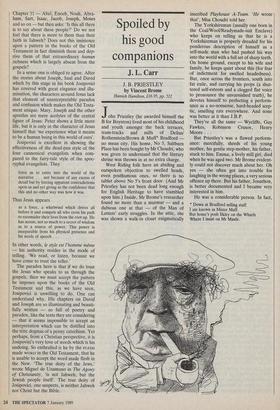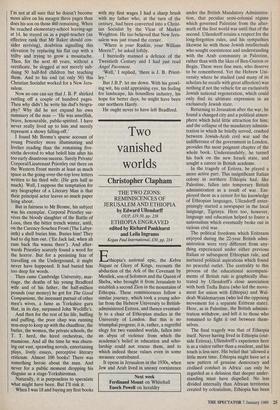Spoiled by his good companions
J. L. Carr
J. B. PRIESTLEY by Vincent Brome Hamish Hamilton, £16.95, pp. 512 John Priestley (he awarded himself the B for Boynton) lived most of his childhood and youth amongst the back terraces, tram-tracks and mills of Delius/ Rothenstein/Brown & Muff* Bradford no mean city. His home, No 5, Saltburn Place has been bought by Mr Choudri, who was given to understand that the literary shrine was thrown in at no extra charge.
West Riding folk have an abiding and outspoken objection to swelled heads, even posthumous ones, so there is no tablet above No 5's front door. (And Mr Priestley has not been dead long enough for English Heritage to have stumbled upon him.) Inside, Mr Brome's researcher found no more than a murmur — and a dubious one at that — of the Man of Letters' early struggles. In the attic, she was shown a walk-in closet enigmatically inscribed Playhouse A-Team. 'He wrote that', Miss Choudri told her.
The Yorkshireman (usually one born in the Coal/Wool/Readymade-suit Enclave) who keeps on telling us that he is a Yorkshireman is properly dreaded for his ponderous description of himself as a self-made man who had pushed his way into the world with a full set of sharp teeth. On home ground, except to his wife and family, he keeps quiet about this (for fear of indictment for swelled headedness). But, once across the frontiers, south into fat exile, and carrying his props (a shut- tered self-esteem and a clogged flat voice to pronounce the unvarnished truth), he devotes himself to perfecting a perform- ance as a no-nonsense, hard-headed scep- tic, smelling rats everywhere. And none was better at it than J.B.P.
They're all the same — Wycliffe, Guy Fawkes, Robinson Crusoe, Henry Moore . . .
But Priestley's was a flawed perform- ance: mercifully, shreds of his young mother, his gentle step-mother, his father, stuck to him. Emma, a lively mill girl, died when he was aged two. Mr Brome evident- ly could not discover much about her. Oh yes — she often got into trouble for laughing in the wrong places, a very serious offence up there. But his father, Jonathon, is better documented and I became very interested in him.
He was a considerable person. In fact, • Down at Bradford selling stuff I am known as Mister Muff. But home's posh Ilkley on the Wharfe
Where I insist on Mr Maufe.
I'm not at all sure that he doesn't become more alive on his meagre three pages than does his son on those 460 remaining. When he reached elementary-school leaving-age at 14, he stayed on as a pupil-teacher (an effective rank that Mr Baker should con- sider reviving), doubtless signalling this elevation by replacing his flat cap with a trilby and trying to grow a moustache. Then, for the next 40 years, without a certificate, he slogged at not merely sub- duing 50 half-fed children but teaching them. And to his end (at only 56) this Christian Socialist worked for a New Jeru- salem.
Now no one can say that J. B. P. shirked rattling off a couple of hundred pages. Then why didn't he write his dad's biogra- phy? Why did he not expand his own summary of the man — 'He was unselfish, brave, honourable, public-spirited. I have never really lived up to him and merely represent a showy falling-off.'
I found Mr Brome's sparse account of young Priestley more illuminating and livelier reading than the remaining five- sixths devoted to what befell him after his too early disastrous success. Surely Private/ Corporal/Lieutenant Priestley out there on the Western Front merits at least as much space as the going-over-the-top love letters written to his third wife. (He gets half as much). Well, I suppose the temptation for any biographer of a Literary Man is that their principal actor leaves so much paper lying about.
But in fairness to Mr Brome, his subject was his exemplar. Corporal Priestley sur- vives the bloody slaughter of the Battle of Loos, then the bitter trench winter, until, on the Carency-Souchez Front (The Labyr- inth) a shell buries him. Buries him! They had to dig him out. (`Ee Jack lad, when ah cum back tha wasna theer'). And after- wards Priestley scarcely found a word for the horror. But for a persisting fear of travelling on the Underground, it might never have happened. It had buried him too deep for words.
Then came Cambridge University, mar- riage, the deaths of his young Bradford wife and of his father, the half-million pounds (our money) he got for The Good Companions, the incessant pursuit of other men's wives, a fame as Yorkshire guru that, in its day, surpassed John Wycliffe's.
And then for the rest of his life, huffing and puffing, the poor chap was running non-stop to keep up with the chauffeur, the butler, the women, the private schools, the T. T. herd, the hired orchestras, the mansions. And all the time he was churn- ing out vast, sprawling novels, entertaining plays, lively essays, perceptive literary criticism. Almost 100 books! There was something heroic about the man. And never for a public moment dropping his disguise as a stage-Yorkshireman.
Naturally, it is purposeless to speculate what might have been. But I'll risk it.
When I was 18 and buying my first books with my first wages I had a sharp brush with my father who, at the turn of the century, had been converted into a Christ- ian Socialist by the Vicar of Market Weighton. He too believed that New Jeru- salem was just round the corner.
`Where is your Ruskin, your William Mortis?', he asked loftily.
I hurriedly manned a defence of the Twentieth Century and I had just read Angel Pavement.
`Well,' I replied, 'there is J. B. Priest- ley.'
But J.B.P. let me down. With his growl- ing wit, his cold appraising eye, his feeling for landscape, his boundless industry, his hope for better days, he might have been our northern Hardy.
He ought never to have left Bradford.











































 Previous page
Previous page